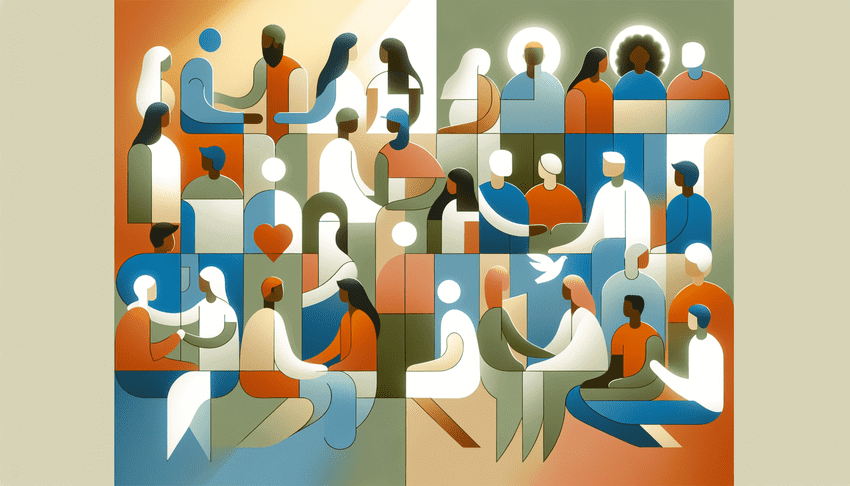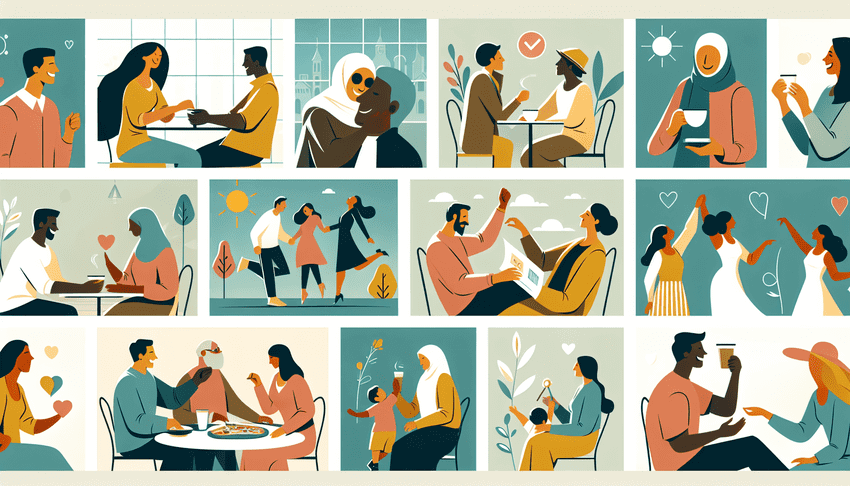Table of Contents
The Power of Interpersonal Relationships

Building and Sustaining Deep Connections
Social Connections are fundamental to human happiness and well-being, influencing our Emotional Intelligence and fostering a robust sense of belonging. Humans are inherently social creatures, and our relationships with others are not just a luxury but a core part of what makes us thrive.
The Essence of Deep Connections The need for deep, meaningful connections goes beyond casual friendships. Harvard’s long-standing study on adult development has demonstrated that the quality of our relationships is the strongest predictor of our overall happiness and life satisfaction. Engaging in meaningful conversations, exhibiting empathy, and sharing personal experiences can significantly deepen our relationships.
- Meaningful Conversations: Beyond small talk, sharing ideas, perspectives, and feelings in a safe environment encourages vulnerability and trust, thus paving the way for substantive bonds.
- Empathy: Understanding and sharing the feelings of another is a pillar of Emotional Intelligence. It helps us to form deeper connections with the people in our lives, showing them that we not only understand their emotions but genuinely care.
- Shared Experiences: Engaging in activities together or enduring similar life events can serve as catalysts for close connections. These experiences allow individuals to relate to each other on a more profound level.
Having deep interpersonal relationships means more than finding people to spend time with; it means nurturing connections that provide support, challenge, and growth.
Emotional Intelligence and Its Role The concept of Emotional Intelligence (EQ) is a major component of forming and maintaining deep social connections. A high level of EQ enables individuals to be aware of their own emotions as well as those of others, facilitating better communication and understanding. Whether it’s recognizing a friend’s subtle body language or responding effectively to a partner’s unspoken needs, EQ can make the difference between a superficial relationship and a deeply fulfilling one.
Consider the example of a manager at work who not only acknowledges the efforts of her team but genuinely appreciates their unique challenges and strengths. Such a manager, equipped with Emotional Intelligence, is capable of creating a work environment that values and promotes strong interpersonal relationships.
The Role of Belonging Belonging, a fundamental human drive, is intrinsically linked to our sense of happiness. Deep connections foster a sense of belonging by affirming our worth and place within a community or circle. In contrast, loneliness and a lack of social bonds can lead to diminished mental and physical health.
A study at Brigham Young University found that lacking social connections can be as damaging to health as smoking 15 cigarettes a day, underscoring the necessity of nurturing our relationships. When we feel that we belong, we not only find joy in our connections but also gain the resilience to face life’s challenges.
In conclusion, social connections are not just about quantity but quality. By engaging in meaningful conversations, practicing empathy, and sharing experiences, we can enhance our Emotional Intelligence, create a sense of belonging, and uncover the joys of deep, fulfilling relationships. As we move through the complexities of modern life, let us remember the value of taking the time to connect genuinely with those around us—for in these connections, we find the keys to happiness.
Navigating Social Challenges
Navigating the complex labyrinth of human relationships is an art one must master for a fulfilling life. Relationship Impact Happiness and Social Connections Well-being are not mere phrases, but the cornerstones of a positive outlook. In addressing social challenges like loneliness and social isolation, the question arises: how exactly do these conditions influence our inner harmony?
Frequent are the instances when the pangs of isolation gnaw at the essence of one’s contentment. Studies in Personal Happiness Studies have unequivocally shown that the quality of our relationships plays a pivotal role in our overall sense of well-being. Conversely, a lack of social interaction can lead to a steep decline in our mental health, often cascading into depression or anxiety.
The Role of Resilience
Resilience is that invaluable trait that allows us to withstand life’s tempests, and it is especially critical when it comes to sustaining social well-being. A resilient individual can bounce back from setbacks and maintain their social networks despite adversities. Reflect upon the story of Emma, a middle-aged woman who, after losing her job, used her free time to volunteer at a local charity. This act not only enriched her life but expanded her social circle, illustrating that resilience can pave the path to new connections and, subsequently, happiness.
Adaptability in Maintaining Connections
The skill of adapting to changing social dynamics is equally crucial. Relationship Quality is not static; it requires an adaptable approach to preserve and nourish. Take, for example, the burgeoning relationship between two neighbors, John and Rahul. Cultural differences could have been a barrier, yet their mutual adaptability led to a friendship that became a source of joy and support for both.
- Navigating Conflict
- Fostering Empathy and Understanding
- Creating Positive Interactions
Conflict is inevitable in human interaction, but its resolution is a testament to emotional fortitude. Learning to navigate disagreements constructively can enhance Relationship Quality and fortify connections. Take the story of Sara and Aiden, a couple who overcame their differences by focusing on finding common ground and fostering empathy. By doing so, they transformed their conflicts into opportunities for growth, bolstering their relationship and personal happiness.
Moreover, empathy and understanding are the salves that heal social wounds. By truly listening and trying to understand others’ perspectives, we create a fertile ground for positive interactions and lasting bonds.
Conclusion
Our engagements with those around us shape our experiences and, by extension, our sense of happiness. Overcoming social challenges requires a mélange of resilience, adaptability, and a commitment to maintaining the quality of our relationships. Remember, Social Well-being is not just about being surrounded by people; it’s about the depth and quality of those connections. After all, as the Personal Happiness Studies suggest, the joy we derive from life is significantly influenced by our relationships with others. Navigating social challenges is never simple, but with the right mindset and strategies, these obstacles can be the stepping stones to a life replete with happiness and fulfillment.
Social Support Systems and Their Impact on Well-being

The Effect of Social Support on Resilience and Recovery
The intricate relationship between Social Connections and our well-being is a cornerstone of Positive Psychology. A powerful determinant of how we rebound from life’s hurdles, Social Connections provide a treasure trove of benefits instrumental for resilience and recovery.
The Pillars of Resilience: Unpacking the Power of Social Support Social support can be likened to a multifaceted scaffolding that undergirds our psychological fortitude. It’s not merely the presence of others in our lives, but the quality of these relationships that fortify our resilience. Social Connections act as a buffer against stress, and research has corroborated that individuals embedded in a supportive social network often fare better during crises.
Take the case of Maria, a single mother recovering from job loss. The empathy and practical aid from her friends provided a safety net that not only mitigated her stress but also bolstered her optimism and energy to re-enter the workforce. Her network’s emotional, informational, and tangible support emerged as key ingredients in her swift comeback.
In contrast, John, facing a similar predicament, found solace and guidance from a local community group, exemplifying how Social Connections extend beyond one’s inner circle and underscore the efficacy of community resilience. These are not isolated anecdotes but mirror academic findings: the significance of Social Connections is an empiric truth.
Recovery’s Companions: How Friends and Family Fuel Positive Outcomes In the realm of recovery, whether from illness, loss, or trauma, the narrative is unequivocal—Social Connections catalyze healing. Allowing ourselves to be enveloped in the warmth of relationships yields comfort and promotes a quicker re-establishment of normalcy.
Consider the story of Alicia, battling a chronic illness, whose swift recuperation was attributed to her robust network of family and close friends. Their consistent presence and emotional sustenance accelerated her healing process, showcasing the tangible impact Social Connections have on physical health, corroborating the psychoneuroimmunology research which explores these interconnections.
Conversely, empirical evidence suggests that social isolation can exacerbate the recovery phase, lengthening the trajectory of affliction. Lily, who underwent heart surgery, found her recovery hampered by loneliness. Her case sheds light on the shadow side of lacking Social Connections, illustrating how isolation can stifle the convalescence we so desperately seek.
To nurture these Social Connections is, therefore, not a luxury but a fundamental aspect of fostering resilience. It is imperative for Positive Psychology practitioners and individuals alike to recognize and cultivate these relationships that not only shield us from life’s storms but also proffer a path to thrive in their aftermath.
Inspired by the authenticity of these narratives and grounded in scholarly research, it is evident that nourishing Social Connections lay the groundwork for a resilient mind and aid in a swifter and more complete recovery. It is within the intricate web of interpersonal connections that we uncover the strength to rebound, the comfort in adversity, and the impetus to grasp happiness.
In analyzing the effect of Social Support on resilience and recovery, we can affirm that nurturing our Social Connections is a vital pursuit. Not only do our relationships catalyze our capacity to withstand challenges, but they also play a crucial role in the very fabric of Positive Psychology and our journey towards sustained happiness.
Community Engagement and Collective Joy
Social connections are not merely an aspect of our lives; they are the very fabric that weaves our collective existence into a meaningful tapestry. Undoubtedly, as humans, the ties we build and nurture within our communities contribute significantly to our individual sense of happiness and fulfillment.
Community Engagement and The Pursuit of Happiness
Through involvement in community activities, we experience a sense of belonging that is both uplifting and empowering. Research in positive psychology demonstrates the positive effects group integration has on our mental health. Engaging with our community, whether through volunteer work, local clubs, or other collective endeavors, allows us to forge bonds that transcend the superficial interactions of our daily lives. Such participation not only enhances our social networks but also anchors our personal identity within a larger narrative.
The joy derived from community engagement is a collective joy. It is the warmth we feel during shared celebrations, the pride that comes from group accomplishments, and the comfort we find in communal support during trying times. It’s the palpable energy at a local festival, the synchronized pulse of a crowd at a concert, and the unified efforts of neighbors helping neighbors in need. These experiences create a ripple effect of positivity, enhancing our Emotional Intelligence as we empathize and grow with others.
Moreover, collective joy often leads to collective resilience. Facing challenges as a group can increase our ability to cope and adapt, giving us a shared strength that might elude us if we were facing our battles alone. This aspect of social connections is particularly relevant in the context of larger societal struggles, where communal unity can be both a balm for the weary soul and a catalyst for change.
Shared Successes and The Multiplicative Effect of Happiness
The notion that happiness can grow and spread through social connections is further supported by the idea of shared successes. When we achieve something as part of a group, these accomplishments feel more meaningful. The concept that ‘success is sweeter when shared’ has roots in our evolutionary past where the triumph of one was often the triumph of the clan. Today, this translates into community projects, group achievements in the workplace, or sporting victories. These collective successes don’t just elevate the individual involved but have the potential to uplift the entire community.
Take, for example, a town that comes together to revitalize a run-down public space: the process involves collaboration, shared goals, and mutual effort. The resulting transformation isn’t just about a new park or community center; it’s about the collective pride and increased cohesion among the participants. Their joint happiness creates a more vibrant, engaged, and emotionally intelligent community.
Social connections also play a role in how we deal with adversity. Communal coping mechanisms, such as support groups or collective mourning, provide platforms for individuals to express their emotions, seek support, and ultimately find solace in the understanding that they are not alone. The shared experience of navigating through grief or hardship can create deep bonds that become sources of sustained support and happiness.
The Symbiosis of Individual Wellbeing and Community Health
Finally, it is critical to recognize the symbiotic relationship between individual wellbeing and the health of the community. As individuals cultivate their happiness through social connections and community engagement, they contribute to a more positive environment that, in turn, nurtures their own and others’ wellbeing. It becomes a self-reinforcing cycle.
In summary, the joy derived from being part of a community is multi-layered and far-reaching. Our social connections do not merely enhance our lives; they are a pivotal component of what makes life worth living. Community engagement provides shared joy, resilience through collective experiences, a multiplicative effect on happiness through shared successes, and a supportive network during times of adversity. The intertwining of our individual journeys with the communal path offers a powerful avenue for achieving a fulfilling and emotionally intelligent existence.
Summary
Social connections are the golden threads that weave through the fabric of our well-being, and the field of Positive Psychology has highlighted their role as central to human happiness. Science has uncovered that our interactions with others impact our Emotional Intelligence and create a powerful sense of belonging that is pivotal to our flourishing.
- Empathy: By stepping into another’s shoes, we cultivate deeper connections, reinforcing our emotional understanding and the bonds that form the bedrock of our Social Connections.
- Meaningful Interactions: Genuine conversations about our dreams, fears, and aspirations foster trust and intimacy, allowing for relationships that truly satisfy our social needs.
- Shared Experiences: From triumphant achievements to shared sorrows, these are the moments that bind us not just as acquaintances but as comrades in the journey of life.
Emotional Intelligence (EQ) is more than just a buzzword; it is the cornerstone of nurturing profound and lasting relationships. It’s what turns a simple exchange into a lifelong connection, enabling us to communicate effectively and empathetically.
Nurturing the Sense of Belonging
Belonging is a basic human instinct, intrinsic to our contentment. When we forge deep connections, we are confirming our importance and place within our social spheres. Conversely, loneliness can erode our mental and physical health, equivalent to the harms of chronic smoking.
Community engagement exemplifies the beneficial impact of shared experiences. It’s where the thrill of a local event or the collected efforts toward a common cause enrich not just individual participants but the entire social landscape. Indeed, our collective happiness amplifies through such communal endeavors, reinforcing our Emotional Intelligence and societal resilience.
Embracing Vulnerability
Embracing vulnerability is perhaps one of the most courageous steps in achieving deep social bonds. Researcher Brené Brown brought vulnerability to the forefront, showing that it’s not a weakness but a powerful avenue to genuine connections. By being open and transparent about our weaknesses and uncertainties, we not only enhance our Emotional Intelligence but also find shared strength in our Social Connections.
- It invites trust: Trust flourishes when we reveal our true selves and are met with acceptance.
- It promotes mutual support: When we share our struggles, we find that others have faced similar challenges, fostering a reciprocal exchange of support.
- It builds deeper emotional connections: Being vulnerable invites others to connect with us on a more profound level, strengthening our relationships.
The Resilience Found in Togetherness
Stories abound of individuals finding solace and strength in their social networks. Whether it’s a group overcoming a collective struggle or an individual drawing on the emotional support of friends and family, these narratives underline the recuperative power of Social Connections. They are not mere anecdotes but reflections of empirical research that underlines the vital role of Social Connections in our psychological armor against adversity.
In this intricately connected dance of Social Connections, Emotional Intelligence, and communal participation, lies the path to a genuinely happy life. As we move forward, let us remember the often-undervalued importance of nurturing our relationships, for they are the very essence of our shared humanity and the heart of our collective pursuit of happiness.
By treasuring these insights, readers are not just informed but inspired to delve deeper into the realm of Positive Psychology. Each social connection, each act of vulnerability, each moment of shared joy is a step closer to the enriched life we all seek. Let us continue the conversation and expand our understanding, weaving a rich tapestry of happy, emotionally intelligent communities together.
FAQ – The Role of Relationships in Happiness
How do social connections and relationships contribute to an individual’s subjective well-being and life satisfaction?
Social connections and relationships are the bedrock of subjective well-being and life satisfaction, as they provide emotional support, a sense of belonging, and opportunities for shared joy. The deep bonds we form with family, friends, and community members act as a buffer against life’s stresses and amplify our experiences of happiness through positive interactions. For instance, the comfort drawn from a supportive friend during tough times or the collective celebration of a community event exemplifies how our social ties enrich our lives and foster our overall happiness.
How do diverse social connections influence individual happiness compared to deep, meaningful relationships?
Diverse social connections sprinkle our lives with a variety of perspectives and experiences, acting like vitamins to boost our social health and happiness by providing different levels of interaction and support. In contrast, deep, meaningful relationships are the hearty meals that nourish our souls, offering profound emotional satisfaction, and a strong sense of belonging and purpose. While both types of relationships are essential, the deep connections tend to have a more lasting impact on our happiness by creating a robust emotional safety-net that can sustain us through life’s ups and downs.
How does the quality of social relationships influence individual well-being compared to the quantity of social connections?
The quality of social relationships has a profound impact on individual well-being, often far outweighing the quantity of social connections. Deep, enriching relationships provide emotional support, build a sense of belonging, and can act as a buffer against stress, whereas a higher number of relationships without emotional depth might not offer the same benefits. For instance, having a few close friends or family members to confide in can lead to greater happiness and life satisfaction than simply having a large network of acquaintances.




